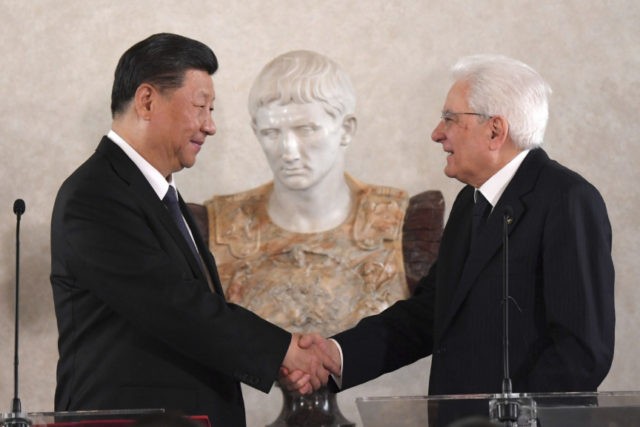WASHINGTON, DC — European countries that joined Beijing’s’ multi-trillion dollar Belt and Road Initiative (BRI) are enabling Beijing’s “repression” of Muslims in its far west, considered a crucial gateway for the project that seeks to connect China to the rest of the world along one route, a top Pentagon official suggested this week.
BRI is expected to be a massive network of land and sea links connecting China’s largest province, Muslim-majority Xinjiang, to scores of countries in Asia, Europe, the Middle East, Africa, and even the Western Hemisphere along one route.
Through BRI, also known as the One Belt, One Road (OBOR) project, China has reportedly expanded its presence in Europe where an estimated 16 central and countries have signed on to the initiative despite the European Union (EU) deeming Beijing a “systemic rival.”
U.S. officials believe China is using BRI as a smokescreen for its military operations and vehicle for “predatory lending” practices that erode borrowing countries’ sovereignty. This year, American military officials warned against China’s growing footprint in Europe.
Referring to Beijing’s crackdown on predominantly Muslim Uighurs [or Uyghurs) in Xinjiang during a discussion hosted by the Hudson Institute on Tuesday, Randall Schriver, the assistant secretary of defense for Indo-Pacific Security Affairs, declared:
I don’t know how 3 million people [mainly Muslim minorities] being thrown into concentration camp-like conditions is underreported, but it is. … If you are doing business with certain companies in a way, you are an enabler to this kind of repression and … we shouldn’t ignore that.
Nevertheless, some experts at the event urged more European countries to join BRI.
“I think that more [European] countries will sign up to the BRI, but that’s not necessarily a bad thing because BRI isn’t going to go away. … I think that’s necessary, trying to ensure that, we can work with China, not at any costs, but…within certain rules,” Liselotte Odgaard from the Hudson Institute declared.
Echoing the U.S. military, the experts noted that Beijing is already operating in Europe with investment ventures and is likely to expand its footprint.
“The union does not have any ideological position on the BRI. We are happy to engage with China also when it comes to connectivity, but we have to make sure that does not happen based on only on the perspectives and reflecting the interest of one party,” Jeppe Tranholm-Mikkelsen, the secretary-general of the EU Council of Ministers, added.
Mikkelsen noted that there are measures in place at the EU that ensures that China’s project “reflects the interest of both parties [and] does not create any undue dependence.”
Some of the experts acknowledged that there are some divisions on supporting the BRI among some European countries. Not all of the European countries that joined the initiative are part of the EU.
Mikkelsen argued that U.S.-Europe relations have been facing some challenges since President Donald Trump and his America First policy took power in 2017.
The top EU official said:
When I look at the U.S. and Europe, sometimes relations have gone a little bit sour lately, and we criticize each other, but in fact, the basic objectives to me seem to be much the same. Sometimes we prioritize different instruments, but that’s not necessarily a problem. That could be seen as a strength, working through different channels towards the same things.
Thomas Duesterberg from Hudson urged the United States not to “lecture” Europe about its ties to other countries and should try to offer an alternative to BRI.
He said:
From the U.S. perspective, when you’re looking at why Italy, white Greece, why Hungary, have latched on to the Belt and Road Initiative is because they have an economic need or they perceive that they have an economic need that is not being fulfilled otherwise.
The United States can’t and shouldn’t try to lecture the Europeans about how they handle their internal economic problems, but there may be ways for some sort of cooperation for … economic development activities.
Experts agree Europe needs to find a balance in its relationship with China, taking into account economic interests and Beijing’s model of governance.
Mikkelsen noted:
I would like to underline that the EU in its relationship with China sees China very much as a partner and as not just a challenge but also an opportunity, but I would say that in looking at those challenges and opportunities the challenges have become more in focus most lately.
U.S. military officials have deemed Chinese operations in Europe and the BRI as a whole as a threat.
Mikkelsen declared the E.U. is open to “reforming” the U.S.-dominated international rule-based to accommodate China, noting:
We want to preserve as I said the rule-based international order, but we also want to reform it. We recognize that the world we are living in has changed and that those rules that have been created a long time ago are not always fit for purpose in the longer and in particular do not always take account of the changing role of China. So we need to reform that order to make it more resilient and more fair and a better fit for purpose.
He stressed that Europe’s “natural inclination” is still to align itself with the United States.
Yun Sun, co-director of the East Asia program and director of the China program at the Stimson Center think tank, told lawmakers late last year that Beijing its using its economic clout in countries that borrow its money to push a “new international order.”

COMMENTS
Please let us know if you're having issues with commenting.